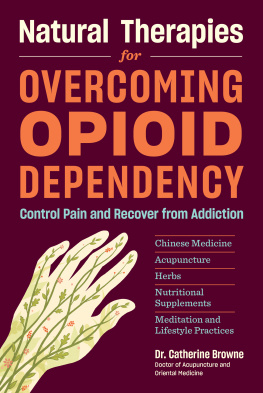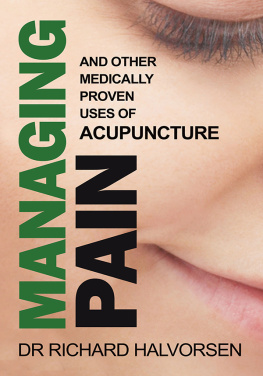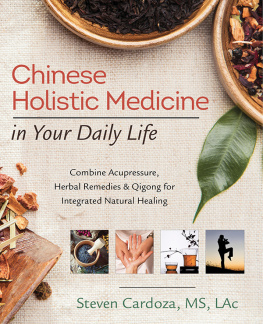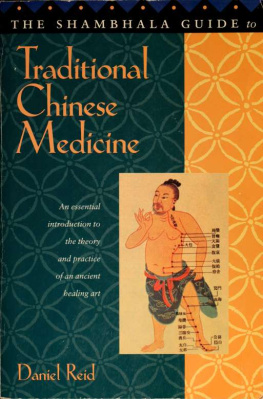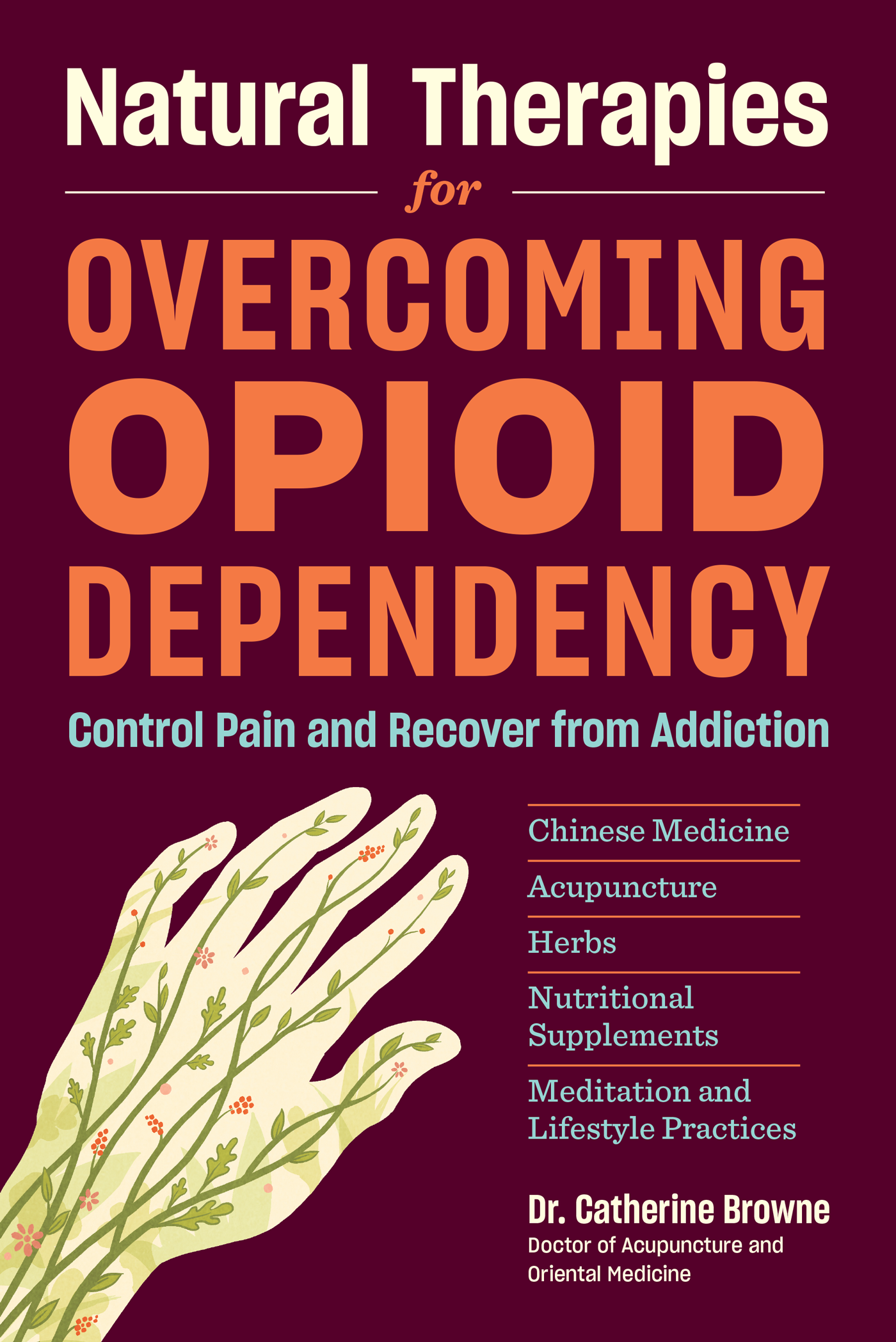Contents
Acknowledgments
Thanks to my teachers, who have been patient, and to my patients, who have been teachers. A special thanks to my teacher Kathleen Leavy, AP, RN; she has graciously trained hundreds of acupuncturists and made the world a better place.
I hold much gratitude in my heart for Barbara Fields, RN, who took me under her wing and taught me manifestion at a higher level, allowing me to bring my dreams to fruition.
I give a special thanks to William VanNess, MD, who invited me into his opioid-free Pain and Rehab Institute. There he has been demonstrating great compassion for patients while alleviating pain without the use of narcotic drugs for decades, long before others recognized the risks of opioid addiction.
Thanks to my mother, Evelyn Padgett, who has been a fearless role model. Finally, I cannot begin to express my appreciation for my children, Emmit and Olivia, who inspire me each and every day, and for my amazingly supportive husband, Bill.
Introduction
Why Consider Natural Therapies?
You, or perhaps your family and friends, may be skeptical that natural therapies could possibly be powerful enough to effectively treat opioid addiction. What sort of natural therapies could hope to compete with established medical and pharmaceutical protocols for a destructive and debilitating health condition of such epic proportions?
As it turns out, high recidivism rates for opioid users indicate that the traditional approach to addiction treatment drug therapy (to detoxify and/or to substitute for opioids), behavioral therapy, and counseling is not working; relapse rates are reported to be as high as 91 percent. Meanwhile, an explosion of scientifically validated, peer-reviewed studies, which you can find at such venerable sources as the National Institutes of Healths PubMed database, are proving that natural therapies treatments that use energetic healing, botanical medicines, and mindfulness to stimulate, support, and heal the bodys own systems of healing can help opioid users successfully overcome addiction, reduce withdrawal symptoms, and manage pain for the long term.
In fact, natural therapies like acupuncture, acupressure, medicinal herbs, essential oils, nutritional strategies, supplements, and meditation have been so successful in clinical applications that they are presently being integrated into the treatment programs of major hospitals across the United States. Western medical practitioners who have been frustrated with the lack of viable options for easing pain, reversing chronic disease, or combating opioid addiction have found that natural therapies can effectively address these health issues. The reasons are multifold:
- Natural modalities are effective medicine. As studies have shown, they stimulate the bodys immune, endocrine, and nervous systems, among other things, and provoke a powerful healing effect.
- While pharmaceuticals are often designed to target a particular deficiency or excess, natural therapies have a broad healing impact. They can address the underlying causes of health problems. Rather than masking or correcting symptoms, they correct the root imbalance that led to the symptoms in the first place.
- Natural therapies are wonderfully restorative. They support patients not just physically but emotionally. Illness, whether acute or long-term, including addiction, is hard on the psyche, and these therapies have been proven to soothe the nerves and brighten a patients outlook simply by virtue of their balancing and normalizing effects.
- Natural therapies have few, if any, negative side effects, and the remedies are generally less toxic and more cost-effective than prescription drugs. Acupuncture, for example, is an excellent alternative to pharmacological treatment for pain, with little risk of side effects.
- Natural therapies are not addictive. In contrast, Western medications used to treat opioid addiction, such as methadone and Subutex (buprenorphine), replace opioids with another addictive substance.
- Natural therapies are effective at reducing or completely eliminating withdrawal symptoms for people who are giving up opioids.
- Following withdrawal, patients can turn to a plethora of natural therapies to fully restore their health and vitality. These treatments can also help prevent relapse; acupuncture, for example, can play an important role not only in overcoming addiction but also in preventing a return to it.
A Difference in Perspective
Beyond the proven benefits of a holistic approach versus traditional treatment, there can be a very real difference between the two approaches in their perspective on addiction. In our culture, we tend to assign a certain stigma to those who become addicted to drugs. We assume some weakness in their willpower, some fault in their choices, some contamination of their character that led them to become addicts and that will forever mark them as addicts.
Traditional 12-step programs, for example, require participants to acknowledge that they are addicts and that their addiction is a lifelong condition. The ostensible intentions are to instill a sense of humility and accountability, to build character, and to establish a foundation of self-awareness and strength. Those are all good principles, not just for addicts but for anyone, in any situation. However, the concept of addiction as a lifelong condition is outdated. Current science on neuroplasticity (which well discuss in ) tells us that our brain has the potential to change and heal. That is, though our brain may become wired for addiction, we can rewire it using holistic mind-body therapies to eliminate the pathways of addiction. So, contrary to much of the literature available from traditional treatment programs, addiction is actually a curable disease.
People like to say, Once an addict, always an addict. But that perspective runs counter to Chinese medical theory and to my personal clinical experience. As a holistic practitioner, I do not view patients as broken, flawed, or immoral; rather, I see my patients as unique individuals who have imbalances that can be modified and corrected through holistic healing methods. And science good, hard science backs me up.
Who Can Benefit from This Book?
Anyone with any form of opioid dependency, regardless of the severity or scope of the dependency, can benefit from the natural therapies discussed in this book. These therapies will help you:
- Wean yourself off opioids
- Manage withdrawal symptoms
- Rebuild your health and vitality after withdrawal
- Manage chronic pain
What qualifies as dependency? You can be dependent on opioids because not taking them leaves you in debilitating pain. Or because youve been taking them, and when you stop, you dont feel well. Or because you dont function as well when you are not taking them. Or because you have uncontrollable intense cravings for opioids. Or because you are unable to stop taking opioids, even though using them is negatively affecting your personal relationships and finances. (Those last two are generally categorized as an addiction rather than a dependency, but the distinction can be a gray area.)
In general, someone who has been using opioids for a few weeks, while in recovery from an accident or surgery, is going to have a much easier time giving them up than the chronic addict who has been using them for years. But what constitutes dependency is different for different people.

